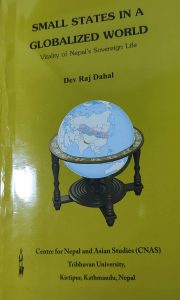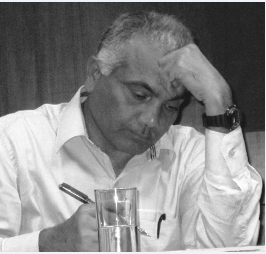Dev Raj Dahal
Senior Political Scientist, Nepal

Europe is seeking its own political evolution probably to clinch Ostpolitik in diplomatic and ideological terms, a middle ground between America and Russia. It is evident from the EU’s solidarity with France against the US-Australia nuclear submarine deal. It ricochet General Charles De Gaulle’s free spirit in foreign policy even at cost of alienating old allies and a separate defense system for Europe away from NATO what it calls strategic autonomy. The US alliance with the EU and France thus casts doubt over the forte of trans-Atlantis unity forged against growing Sino-Russian political, economic and strategic muscle.
The assertiveness of Europe reveals its disinclination to accept politically dwarf status, seek freedom from Anglo-Saxon world, express political will to act an independent interlocutor among great powers and recover freedom of maneuver that was unused for reasons of infatuated Sino-Russian entente cordiale. The engagement of Turkey, a member of NATO, in Afghanistan and purchase of Russian missiles for its air defense despite the US objection marks the return of old European realpolitik. The European NATO members too feel betrayed by the US withdrawal from Afghanistan without consulting them that eased Taliban’s takeover. Though the US found disproportion between the costs of staying in Afghanistan and the strategic stake, its withdrawal exposed the vulnerability of Iran, Pakistan, Kazakhstan China and India to the risks of terrorism unless Taliban regime adopt civilized conduct.
India and Iran are facing a dilemma with regard the legitimacy of the Taliban government, the former for the fear of its engagement in Kashmir while the latter fears the collusion of its radical faction with the Islamic State (ISIS).

The US as a lone superpower for long figured top in Nepal’s foreign policy of diversification of international relations and helped escape from neighborhood geopolitical determinism. On September 14, 2017, the U.S. Govemment’s Millennium Challenge Corporation (MCC) and the Government of Nepal signed a $500 million compact to spur the latter’s economic growth and reduce poverty. The U.S. aid entices Nepal to serve as a strong pivot in the Indo-Pacific Strategy to contain China in the Himalayan geopolitics. Its major component, inter alia, is designed to support the 400 KV New Butwal-Gorakhpur transmission line projects. But in the absence of consensus within the mainstream political parties about its endorsement by the parliament, the projects future lingers. The U.S. has time and again suggested pusillanimous Nepali leaders to become pro-Nepal to safeguard sovereignty, security and freedom and see the world beyond India and China (Adhikari, 2005:45). The then U.S. Secretary of State Mike Pompeo said the U.S. is “shifting its military from Europe to face “Chinese threat to India, Vietnam, Malaysia, Indonesia and the South China Sea” adding that “he would open a dialogue with the European Union on China” and voiced “hope it would lead to tougher action.” In this context, China sees Nepal “the ideal front to implement its encirclement” (Shengping, 2021:4). India believes that if China is tied to its internal problems in Taiwan. Tibet, Hong Kong and Xinjian and externally with the Japan, Vietnam, the USA, the UK and Australia, it can have “greater diplomatic leverage in its bilateral ties with Nepal, Bangladesh, Sri Lanka and Burma“ (Kaplan. 2014: 180).
The U.S. finds pivoting relations with the middle ranking nations of Asia a positive counterweight to the Chinese power and active participants of its Indo-Pacific strategy aiming to block China from controlling the Pacific Ocean and expanding its influence in the Southern Asia. The U.S. figured prominently in Nepal’s decision to eschew signing Extradition Treaty with China, obligations to gentlemen agreement on Tibetan refugees, support to the modernization of society and signing of MCC though the last one sparked controversy in the mainstream political parties for its inept handling and the critics’ perception of the deflation of national sovereignty. Its proponents believe that Nepal’s elevated ties with the U.S. would allow it to vault into a multistate global system, reset foreign policy, and enable the U.S. to see Nepal through its own eyes, not the Indian ones and acquire a broader strategic gaze to be heard and heeded to in world politics. Nepalis believe that Sino US competition in Nepal has constrained India to operate strategically in the sphere of assertive bilateralism and moderated its appetite for regime-changing behavior (Bleie and Dahal,2019:4).
The Sino-U.S. economic interdependence does not encourage both for a large-scale brawl, engage in a trade war and decoupling but entails the joint duty to rebuild this shattered world and resolve global problem of pandemics, climate change, nuclear proliferation, terrorism, stop North Korea from doing anything irritating and polarized development of the world where population explosion in the developing nations ant prosperity in the advanced countries do not make a recipe for a stable global order. China’s humanitarian image has spread to Asia, Africa Europe and Latin America as it supplied vaccines against corona virus to over 90 countries. The European nations have varied scales engagement with China-Italy is a member of the Belt and Road Initiative (BRI) and the UK is a member of the Asian Infrastructure Investment Bank (AIB). India is in BRICS’ New Development Bank Sino-Russian Security architecture Shanghai Cooperation Organization (SCO) created to counter NATO’s expansion and Boao Forum for Asia and trade between the two nations escalated to over $100 billion. India, however, is not a member of BRI for the reason of its support to China-Pakistan Economic Corridor (CPEC) linked to Gwadar port economic and strategic connectivity, energy transaction and regional economic integration of South and Central Asia. It is worth $62 billion Though the EU Commission considers China “economic competitor and “systemic rival” fostering alternative governance, many European nations defend the interest of their own companies, seek opportunities for them in China and even smaller states writhe economically and diplomatically side by side with China’s initiatives.

In a fateful situation plagued by COVID-19 when globalization is constrained by the flow of people and goods, knowledge-procurement and exploration of options for cooperative relations of small states Nepal continues to struggle to get support in health supplies, avoid the perils of great game and domestic polarization by balancing divergent interests. Its excavation and application of the wisdom of the pas golden mean have helped ensure the vitality of independence. Owing to the centrality of its strategic space relevant to the security of both neighbors-India and China-Nepal has to construct its own security analyzing the strategic shifts in its external milieu and hone the virtue of small state’s national interests beyond ideological loyalties and rhetoric. It helps to eschew any temptation to align with the offensive policy of great powers against each other. Nepal’s tacit phase of official diplomacy needs to be shifted to a multi-track level with constant communication of messages that clarify, not confuse, common interests for a negotiated settlement of one after another national, bilateral and multilateral issues affecting it. Nepal’s foreign policy orientation cannot be separable from the quality of consensus of internal politics.
Leadership perception of changing configuration of regional and global powers defines which nations have a greater stake in Nepal’s peace, stability and wellbeing. It needs to learn the comparative politics of other small states as to how Nepal’s national interests can be propped up in turbulent times.
The Chinese interest in Nepal has increased for obvious reasons: growth of its power and will, security of its geopolitical underbelly Tibet where many great powers of the West and India have converging interests, neutralize anti-Chinese forces operating in Nepal defining its policies, laws and activities, promote Nepal’s ability to assert independent maneuver and enhance defense, trade, commerce and cultural cooperation with it in particular and South Asia in general. Out of three-tiered diplomacy-state to state, people-to-people and party to-party the last one, however, suffered a setback as China misjudged the artificial unity of Nepali left parties into Communist Party of Nepal under its mediation, political culture of their leadership and attributional affinity to India and the West. On June 28, 2020, Prime Minister KP Sharma Oli (former) revealed a worrying sign internal and external elements had started making movements against the present government after it issued the updated map of the nation by including Nepal’s territory encroached by India.” He sees his rivals in the party less patriotic and India as a partisan meddler than a mediator to reverse the cycle of political flux. Connectivity, science and technology and diversification of international relations can help Nepal escape from the geopolitical buffer and what the then Prime Minister Oli called “neighbors-locked foreign policy forever,” an explicit expression to diversify the nation’s international relations to various directions. The keenness of Nepal to engage with extra-regional powers arose out of its anxiety to being subjected to bigemony like the Lipulekh accord signed between the neighbors without consulting Nepal which legitimately claims a share in the territory lying in tri-junction, increase its leverage to deal with neighbors, fill resource gaps, reap opportunities and project is independent identity.
The Chinese plan to execute the Trans-Himalayan Multi Dimensional Connectivity Network to boost cooperation in railways highways, ports, aviation, communication, transit and transport, opening of three more passes-Koshi, Gandak and Karnali aside from the already existing ones-Tatopani and Rasuwagadhi and direct air links of Nepal with Lhasa, Chengdu, Kunming, Guangzhou and Hong Kong have scale up Nepal-China ties. Collaboration on sister cities has offered Nepal alternative diffusion of modernity. China ranks top among bilateral and multilateral donors in foreign aid, foreign investment, second-largest trade partner after India and second-largest source of tourists flows after India. In 2016 Nepal and China signed the Transport and Trans Agreement during Prime Minister K. P. Oli’s visit and protocols to this effect were signed during the visit of President Bidya Devi Bhandari China in March 2019 which allowed Nepal to use seven Chinese ports for the diversification of its trade. In practical terms, however, critic argue, “China’s offer is less than appealing, at least in the short-run because of the cost, physical distance, and arduousness of traversing a vast and difficult terrain to reach the Chinese port, it does offer morale boost to Nepal’s apparent shift in its foreign policy” (Shrestha and Bhattarai, 2017: 168). Similarly, further progress in transit and BR projects has been delayed partly due to external pressure, partly politica instability and partly modality of project implementation. As a member of BRI and AIIB, Nepal has refused to share outsiders’ perception that BRI is debt-trap diplomacy, remained firm on one-China policy an promised not allowing its territory to be used by a third country again China.
“Nepal has historically defended the Chinese security against the Muslim and British invaders and now the Western and the India convergence of interest on Tibet and, therefore, it expects China unconditional support to Nepal’s security, stability and development (Karki, 2019).
Text courtesy: Excerpts from the recently published book, (2022) “Small States in a Globalised World”, by Centre for Nepal and Asian Studies (CNAS), Tribhuvan University, Kirtipur, Kathmandu, Nepal.
# The entire editorial board of the telegraphnepal.com is highly indebted to the senior political scientist of Nepal, Professor Dev Raj Dahal and the Executive Director of the CNAS Dr. Mrigendra Bahadur Karki.
# published in the larger interest of the global audience: Chief Ed.
Our contact email address is: editor.telegraphnepal@gmail.com
